9 Simple Feng Shui Bedroom Fixes to Invite Calm and Balanced Energy for Rest
Perfect the restorative energy of your sanctuary's layout, lighting, color, symmetry, and more

Jennifer Ebert
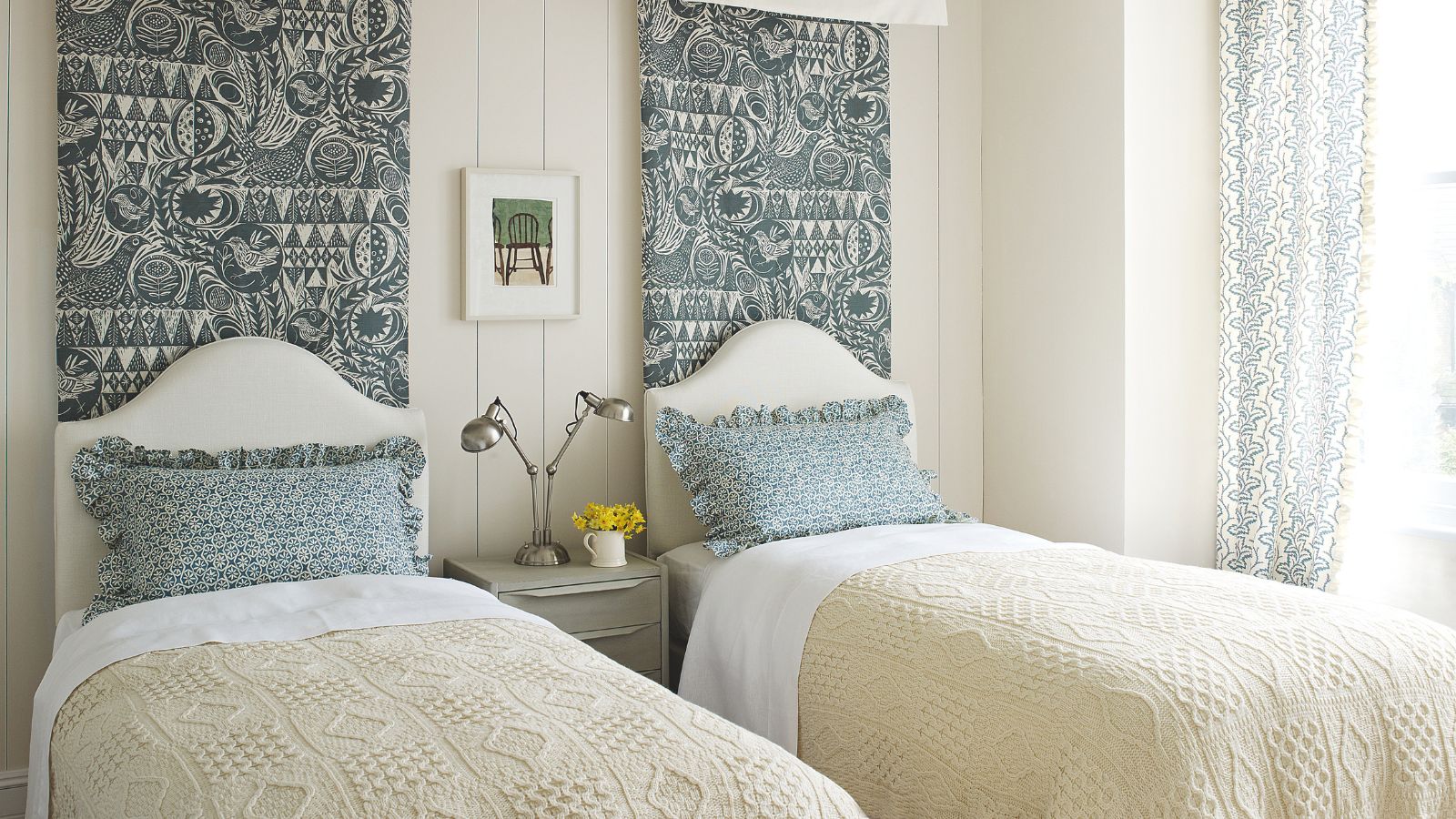
Having the best bedroom Feng Shui is far more important than you might think, and drawing on the ancient principles of this longstanding Chinese practice to harness good energy can help you transform your sleep space.
It's easier than you may believe, too, but there are more than a few things to keep in mind, from your room's layout to your use of mirrors, symmetry, and beyond.
Whether you are in the know about the meaning of Feng Shui or you're an absolute beginner, this expert-led guide details everything you need for using its fundamentals to bolster your bedroom in easy-to-understand-and-implement terms.
What You Need to Know about Great Bedroom Feng Shui
It's not just about implementing the best bedroom Feng Shui, but also knowing about the Feng Shui features to avoid in this key area of your home. More than any other space, your bedroom is the one place where you want to feel completely relaxed, comfortable, and rested.
Here, we’ve detailed together the best feng shui tips and bedroom ideas to allow you to create the most perfectly calm-inducing and zen sleep sanctuary.
1. Find the Right Bedroom Layout
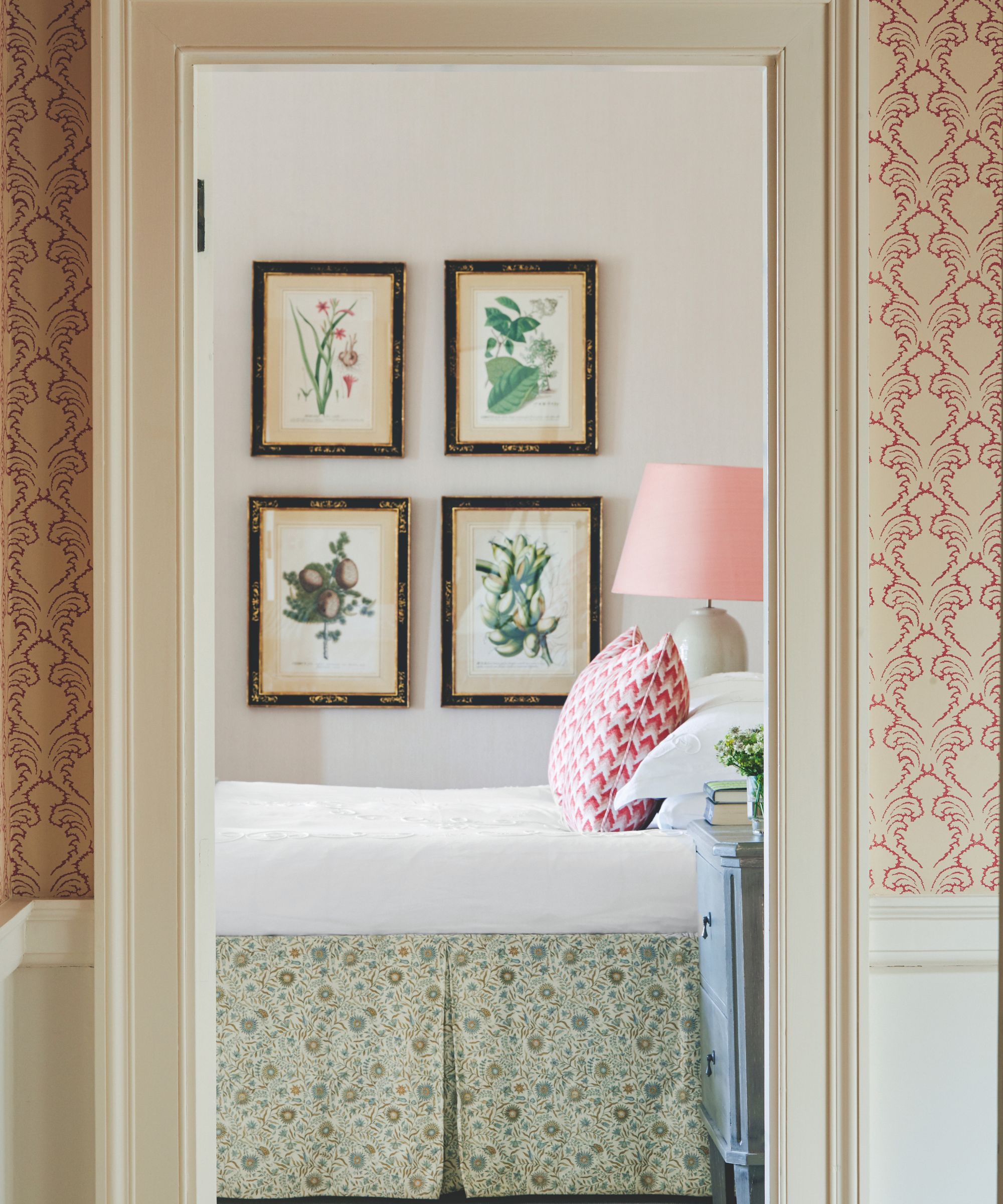
Your room's layout can have a huge impact on the effectiveness of your bedroom Feng Shui.
Bedroom layout ideas are an essential part of any Feng Shui bedroom design, and the most important decision to make is where to position the bed. Often the largest piece of furniture in the room, it will have a big impact on how the space functions, looks, and feels.
As Suzanne Roynon, Feng Shui consultant and interiors therapist, shares, 'Feng Shui is about connecting to the energy of the home, and the bedroom is a place where we need to feel grounded and at ease, so everything begins with the position of the bed.'
Design expertise in your inbox – from inspiring decorating ideas and beautiful celebrity homes to practical gardening advice and shopping round-ups.
For that reason, be sure your bed is not under a beam and is in a commanding position, with your headboard up against a solid wall. Sleeping north-south (with your head in the south and your feet in the north) is considered to be the best for your well-being.
This is because, in Feng Shui, it is considered that sleeping facing north can increase sleep disorders, and leave you lethargic and unmotivated in everyday life; the result of which is decreased luck and prosperity.
Sleeping facing north is also thought to increase your blood pressure and even cause headaches upon waking up. You'll want to avoid the dreaded Feng Shui 'death position,' where your feet point towards the door no matter which sleep position you're in, too.
‘Ideally, you would be able to see the door from what we call ‘the command position’ which means you are immediately aware of anyone coming into the room and have visual control of the space,' adds Suzanne.
Feng Shui believes energy flows through the doors and windows of a room, which is why, though the door should be in sight when you're lying in bed, you should not be directly in line with, in front of, or adjacent to it. So, it's best to position your bed off this path and away from both, with open space, ideally around 18 inches, on either side of the bed, to balance yin and yang.
If this is not possible in your space, you can correct the bed position by using a mirror, such as the Mirta Rectangle Metal Full Length Mirror, available at Wayfair. Simply place a mirror so that when you’re in bed, you can see the reflection of the door.
You also don’t want any doors to open up directly in line with the bed, particularly your ensuite door, as this will allow good Feng Shui energy to escape through the bathroom drainage.
Consider rearranging your room entirely (the best date to do so is just after a full moon) if you believe negative Feng Shui may be causing you minor sleep disturbances.
If you're really committed to good bedroom Feng Shui, you should also never hang art vertically in your sleep space – it commands more presence and can make the energy of the room feel more 'active' than is ideal for sleeping well.
'Select art for the bedroom which describes the type of relationship you want for yourself,' advises Suzanne. 'This isn’t the place for challenging, miserable, angry, lonely, or disruptive art – aside from anything else, it will interfere with slumber, and from a Feng Shui perspective, we often find life mirrors the art on the wall.'
So, the right type of artworks should also radiate positive energy, but shouldn't be hung over your bed, as this may feel oppressive. Also, avoid hanging artworks that depict water, or family photos – the bedroom is a place for rest, romance, and relaxation, not for family mementos.
'If you’re in a loving relationship, display happy photos of you with your beloved and no one else,' adds Suzanne. 'It’s not the place for pictures of you on your own because they can reinforce feelings of solitude – even in a marriage.'
2. Invest In a Solid Headboard
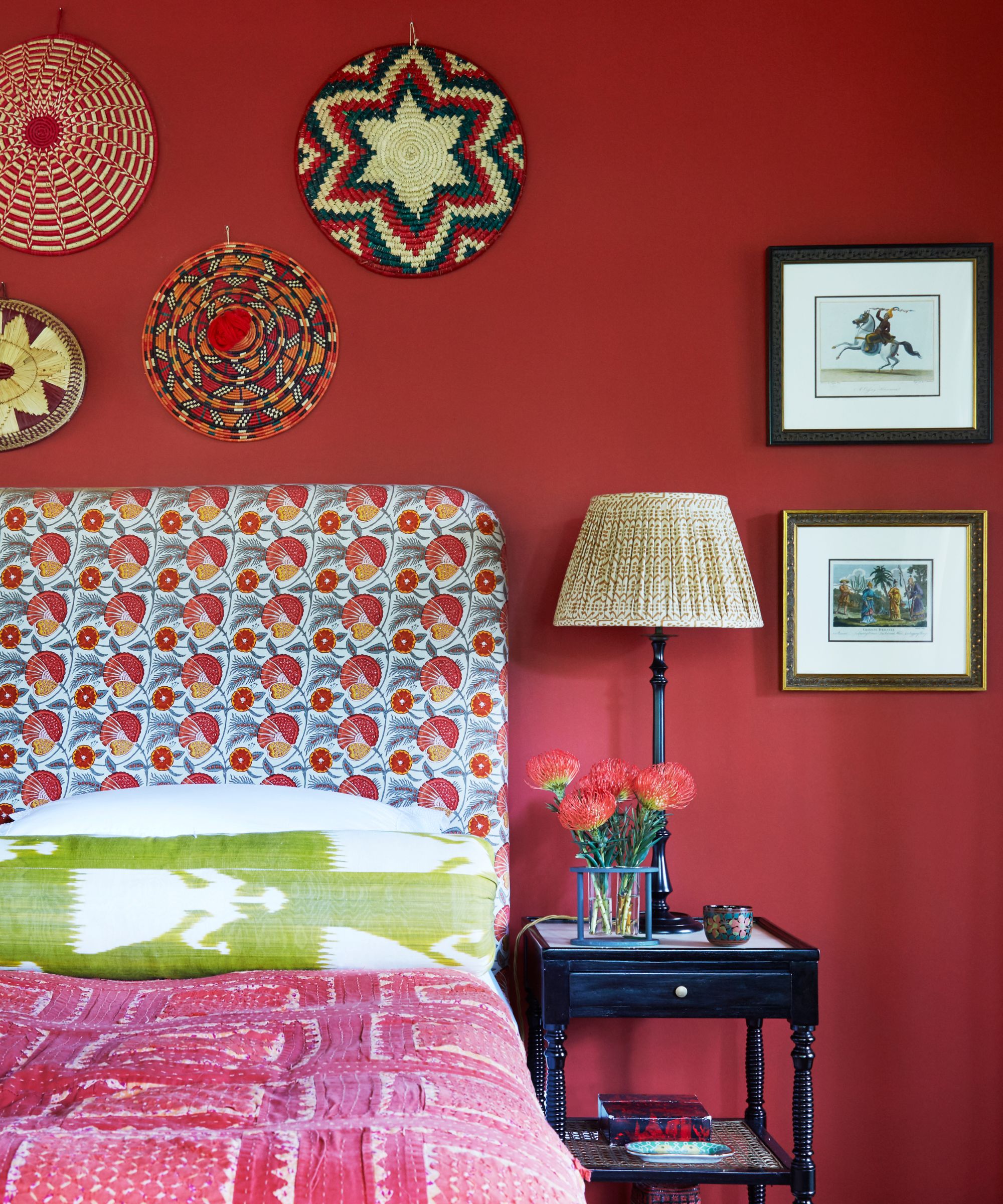
A patterned headboard can lift your space and invite positivity.
Feng Shui philosophy suggests that the headboard represents stability, support, and security in your life, especially in your romantic relationships, and offers psychological protection for the head, neck, and shoulders during sleep.
Whilst you may ask why a headboard is important in Feng Shui in particular, there are numerous reasons experts say you should have one. From a functional point of view, you need a headboard to cushion your head and back when you are sitting up in bed, and to protect your head from the wall. The best Feng Shui headboard ideas are solid, without any perforations.
For that reason, it's best to choose a firm yet comfortable headboard. 'Feng Shui discourages metal or perforated headboards as they don’t provide the sense of invulnerability for the head and neck, which is experienced with a strong wooden or padded option,' explains Suzanne. The SLÄKT Headboard, available at IKEA, is a good, affordable pick.
You may, in some cases, choose to ditch your bed altogether and opt instead to sleep with just your mattress on the floor. While this can affect your back, it can help with temperature regulation, blood circulation, and help you to save on money and space, particularly when trying to avoid any small bedroom layout mistakes.
Before you do so, though, consider the Feng Shui consequences – perhaps a low Japanese-style bed with a headboard would be a better alternative.
Headboards are vital for aesthetic reasons, too. They provide a focal point, can introduce color, pattern, and texture, and can help to correct and improve a room's proportions and visual impact.
3. Use a Feng Shui Color Palette
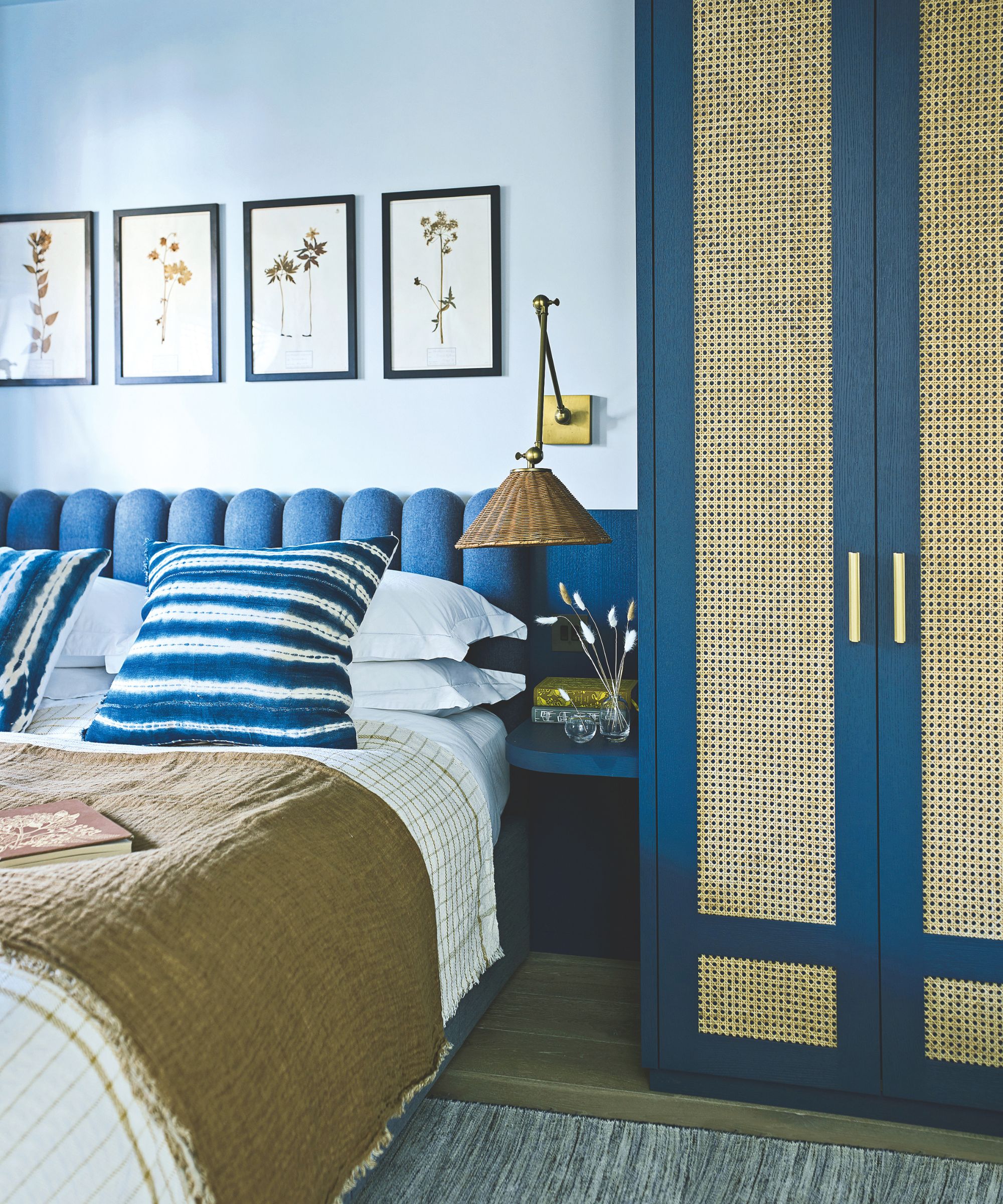
Blue is a calming bedroom color.
In Feng Shui, certain Feng Shui bedroom colors are thought to promote restfulness, sensuality, and serenity in the bedroom – and enhance sleep. As a general rule of thumb, it is best to decorate with the muted shades you'd find in nature. Think pale blues, yellows, greens, and subtle neutrals.
As Suzanne explains, 'Calming gentle colors are superb in a bedroom, with earthy and softer tones contributing to restful sleep.'
Blues are easily the palette of choice for many, from amateur decorators to interior designers, as they’re incredibly easy to live with and perfect for layering.
Patrick O’Donnell of Farrow & Ball says, ‘Blue bedroom ideas also come with positive attributes in both color psychology and Feng Shui, such as sympathy, encouragement, spirituality, loyalty, and thoughtfulness,' he says.
Another fantastic choice for a well-appointed, Feng Shui-optimized bedroom is green. Green is a calming and relaxing bedroom color idea as it represents nature, and makes us feel good and positive. For this, Green Ground, available at Farrow & Ball, is perfect.
You may also opt for yellow, to inspire optimism, pink room ideas to introduce subtle sensuality, simple white bedroom ideas for versatility, or purple tones to dispel negative energy.
And, while they may feel a little overwhelming, red bedroom ideas are seen as prosperous, inspirational, and lucky in Feng Shui. If curating a completely red room is not for you, you can try adding red elements throughout the decor, with an area rug, artwork, bedding choice, or blanket, such as the red VINTERFINT throw, available at IKEA. You can also implement the unexpected red theory, with a small but chic decor or upholstering decision.
It is important to remember that when decorating with bedroom Feng Shui principles in mind, influential elements such as bold colors should not be thrown haphazardly into a space in the hopes that they will create a positive effect. Instead, balance a few powerful pieces for a beautiful and harmonious space, particularly if you plan on going bold with black bedroom ideas.
After all, adds Suzanne, 'Choosing the right Feng Shui bedroom colors can help to create the soothing and energizing environment you need.'
4. Double Up With Pairs and Symmetry
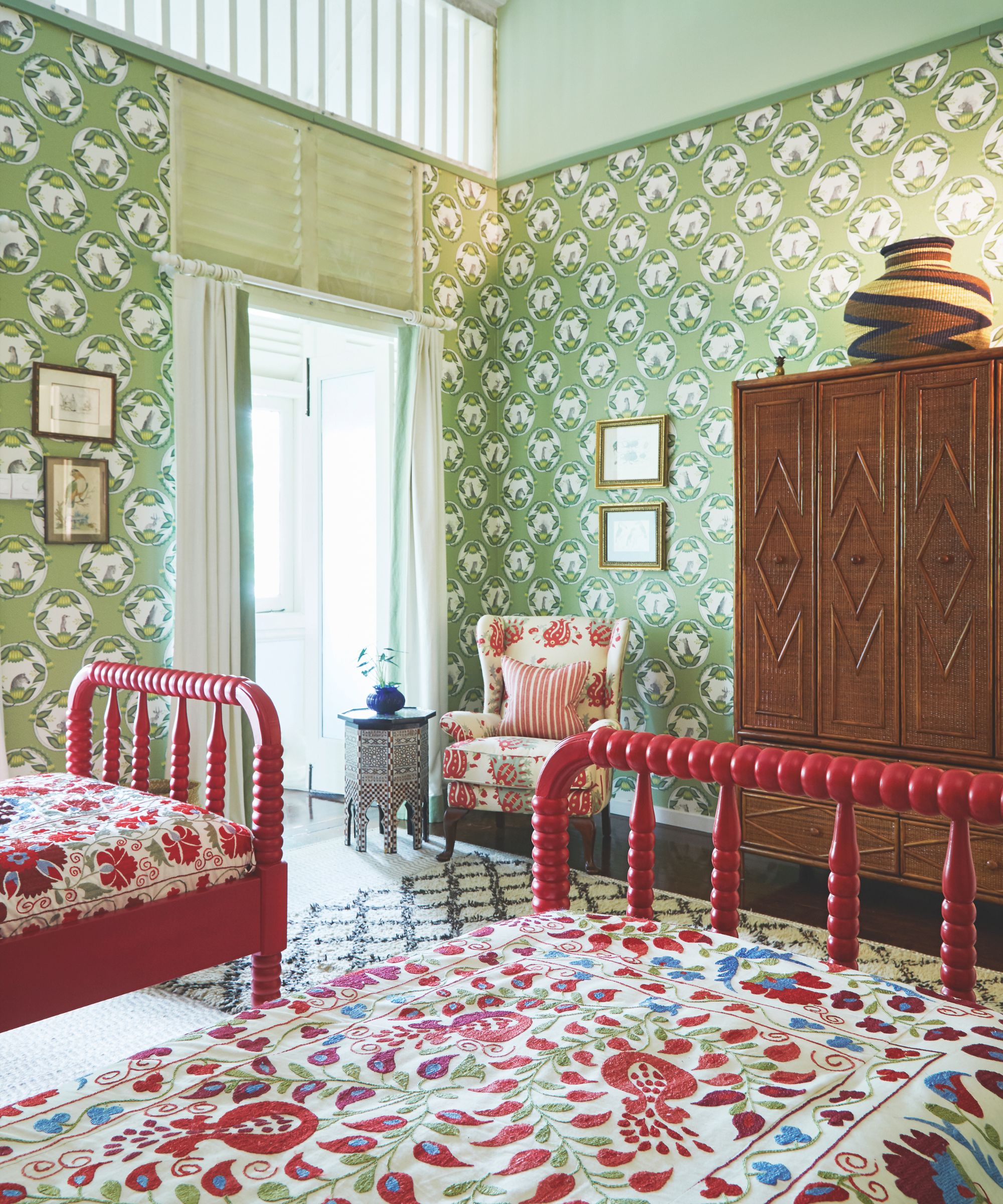
Pairs promote harmonious energy in bedroom, and wider, Feng Shui principles.
Symmetry is an interior design trick used to create smart-looking rooms – and it's perfect for the bedroom.
In Feng Shui, pairs are thought to promote harmonious energy, so kit your bedroom for two people, even if you're not currently in a romantic relationship.
This is because having two identical bedside tables, preferably with rounded edges, like these Wood Nightstands, available in a set of two at Wayfair, to prevent sharp, negative energy near the bed, known as 'poison arrows,' can create a harmonized space and improve relationships.
The symmetry can be heightened with identical lamps. This is to ensure the energy surrounding the sleepers is in harmony.
Liv Wallers from British design studio, Yellow London, explains, ‘Symmetry brings a sense of comfort and rhythm to a space which is an integral part of the Feng Shui design process.'
5. Declutter
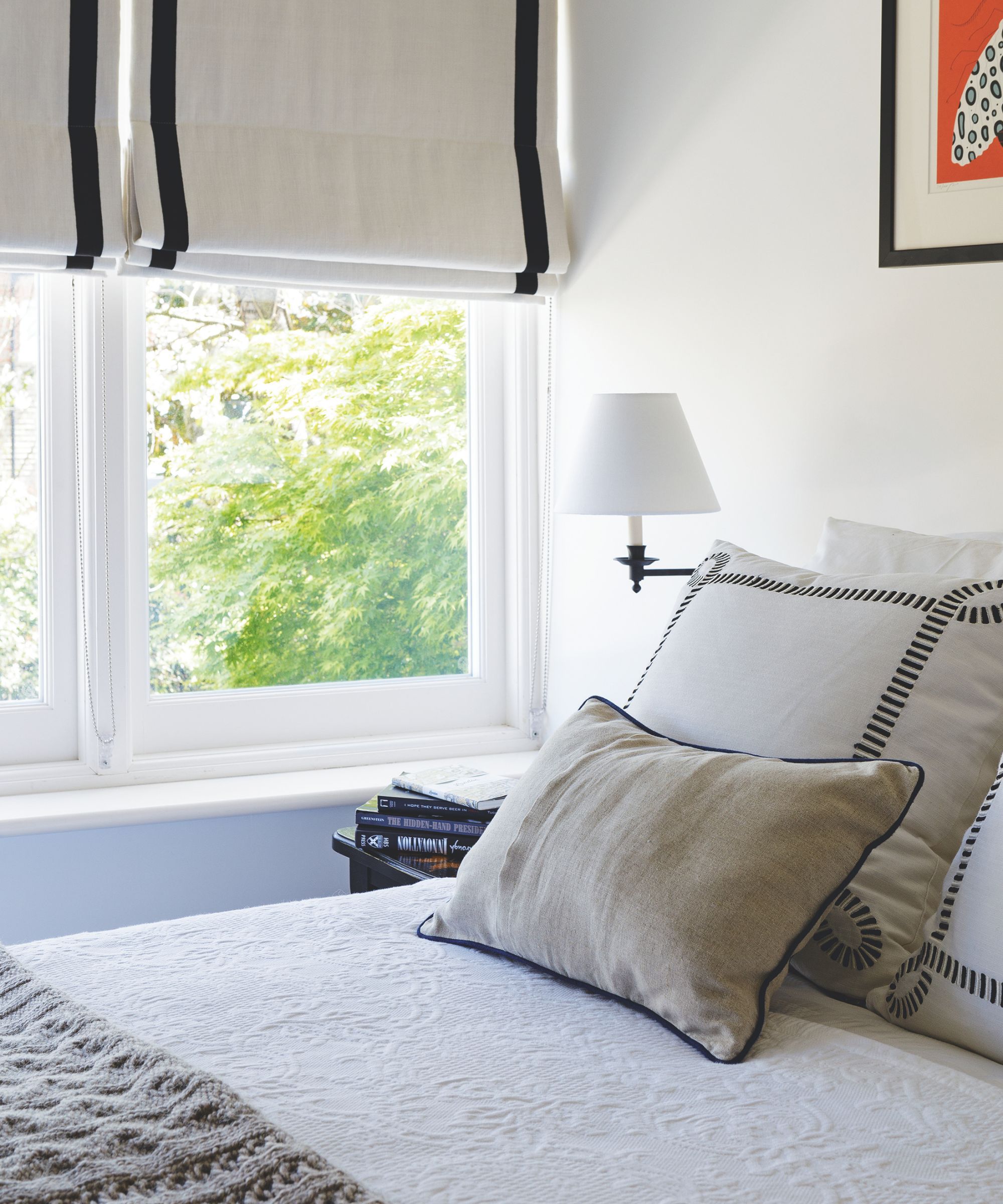
Decluttering is key for maintaining good Feng Shui and allowing positive energy to flow without clutter blocking its path.
Decluttering a bedroom is one of the best things you can do for a restful night’s sleep. When it comes to positive chi (a life force that powers all living organisms) in the bedroom, there’s more at stake than just a neat space.
‘Clutter harms health, sleep, relationships, and every aspect of life,’ says Suzanne. ‘Feng Shui is all about a positive flow of energy around a home and within each room. If the flow is blocked by clutter or surplus possessions, it will have a detrimental effect on the people who live with it.’
According to the experts, clutter can also trigger stress hormones that affect our sleeping patterns, in turn affecting our overall happiness and well-being.
So, to begin with, take a good look at what you have stored under your bed. Items stored under the bed affect you while you’re asleep in a passive 'yin' state, and could be creating subconscious blocks in your life.
For that reason, there are several things that Feng Shui governs that should never be stored under your bed, such as shoes, paperwork, books, photos, exercise equipment, and anything related to work.
If possible, in Feng Shui, it’s recommended to have nothing under the bed at all, other than a glass of water, which is said to absorb bad energy while you sleep. Then, the chi can flow freely throughout the space – and rejuvenate you while you’re sleeping.
If you do need to store items under your bed, as might be the case in small bedroom layout ideas, from a Feng Shui perspective, having closed-off storage, available at Amazon, is ideal as it conceals clutter and emotionally charged items. It is also best to store sleep-related items such as linens, duvets, or pillows underneath to maintain the restful feeling of the space. But in an ideal world, the number of items under there would be minimal.
It’s not just clutter that can hurt your state of mind. Devices (including TVs), desks, and anything work-related should be banished from the room, too – they can create an association of alertness and stress instead of relaxation, which is not ideal in a room designed to unwind.
Suzanne adds, 'As the subconscious mind is responsible for 95% of your thinking, the presence of a TV in a bedroom is likely to be a major reason for your brain remaining active throughout the night – it’s no wonder you are exhausted when the alarm bleeps.'
The electromagnetic waves emitted by technology are also thought to interfere with the body's ability to sleep deeply and regenerate overnight. That could include a clock, radio, or mobile phone. If you can't remove everything entirely, invest in a battery alarm clock, available at Amazon, unplug everything at night, and charge your phone in another part of the house.
The same applies to your shoe storage ideas, which can create a negative energy field if placed in your room, consequently creating a negative sleep environment and disrupting your sleep.
6. Invite Restorative Energy with Fresh Foliage
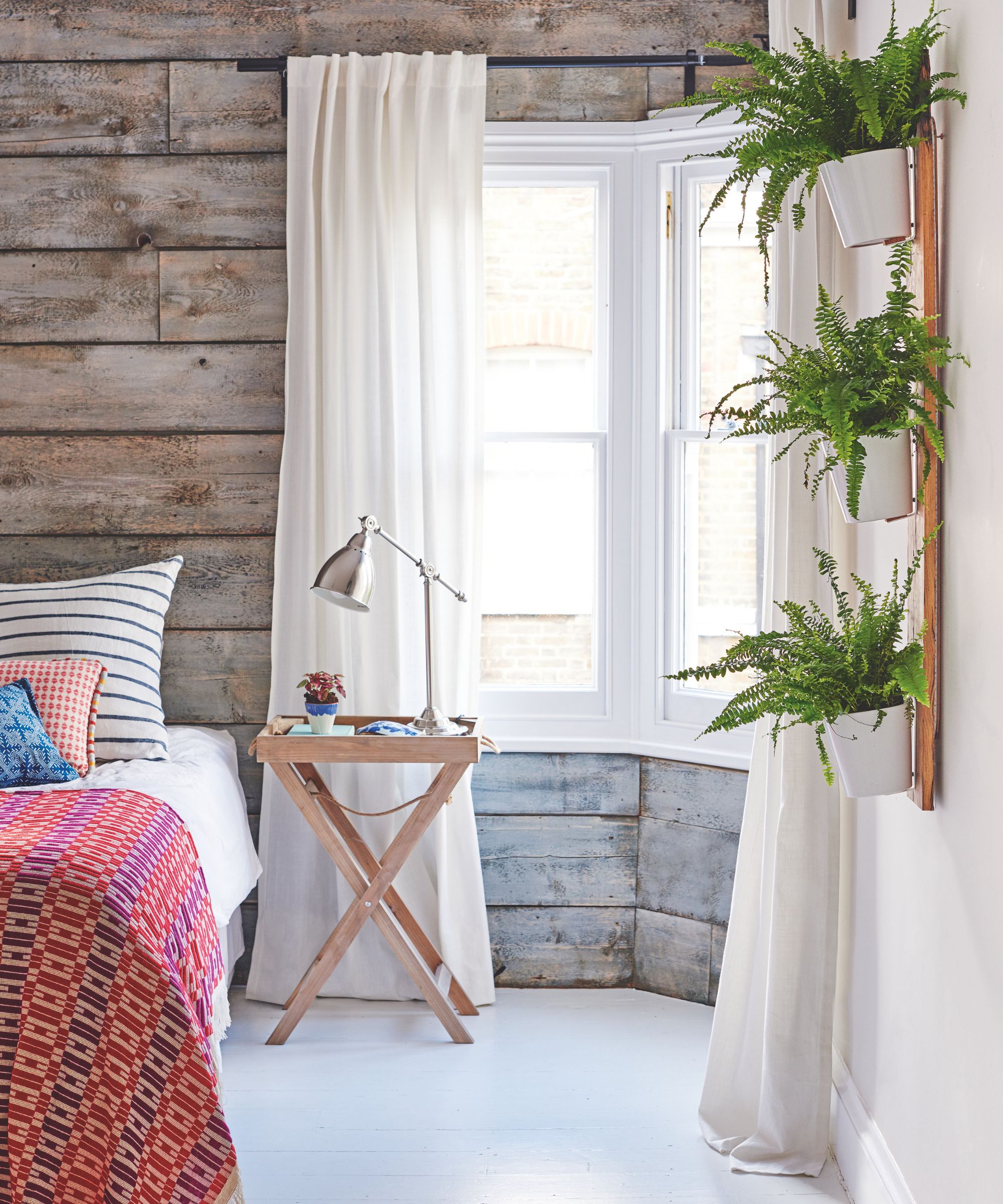
Houseplants bring natural balance and harmony to your sleep space.
As we seek to reconnect with nature and the environment, decorating with plants indoors has grown immensely in popularity. Feng Shui places a lot of emphasis on the importance of natural materials and live elements, which can aid in the circulation of chi energy and bring balance and harmony to a space.
Noted to invite growth, prosperity, and therapeutic energy when positioned in a bedroom, houseplants have always been an essential part of household Feng Shui, and for good reason. The same applies to bedrooms.
Simply treat yourself to some fresh seasonal flowers in a pretty jug or vase, such as the Emma Clay Vase, available at Anthropologie.
Importantly, though, while a cactus is a fail-safe decorating choice in terms of aesthetics and an easy indoor plant to care for, it is less favorable amongst Feng Shui professionals.
Steve Adams, sleep expert at Mattress Online, explains, 'Due to the sharp, defensive spikes of a cactus, it is not advised to have one in your sleeping area as it is believed that they can transmit bad energy into the surrounding space.'
Instead, add some of the best air-cleaning indoor plants to improve the relaxing energy and oxygen flow of the bedroom, and encourage higher sleep quality. These can include spider plants and peace lilies.
7. Put the Focus on Functional Lighting
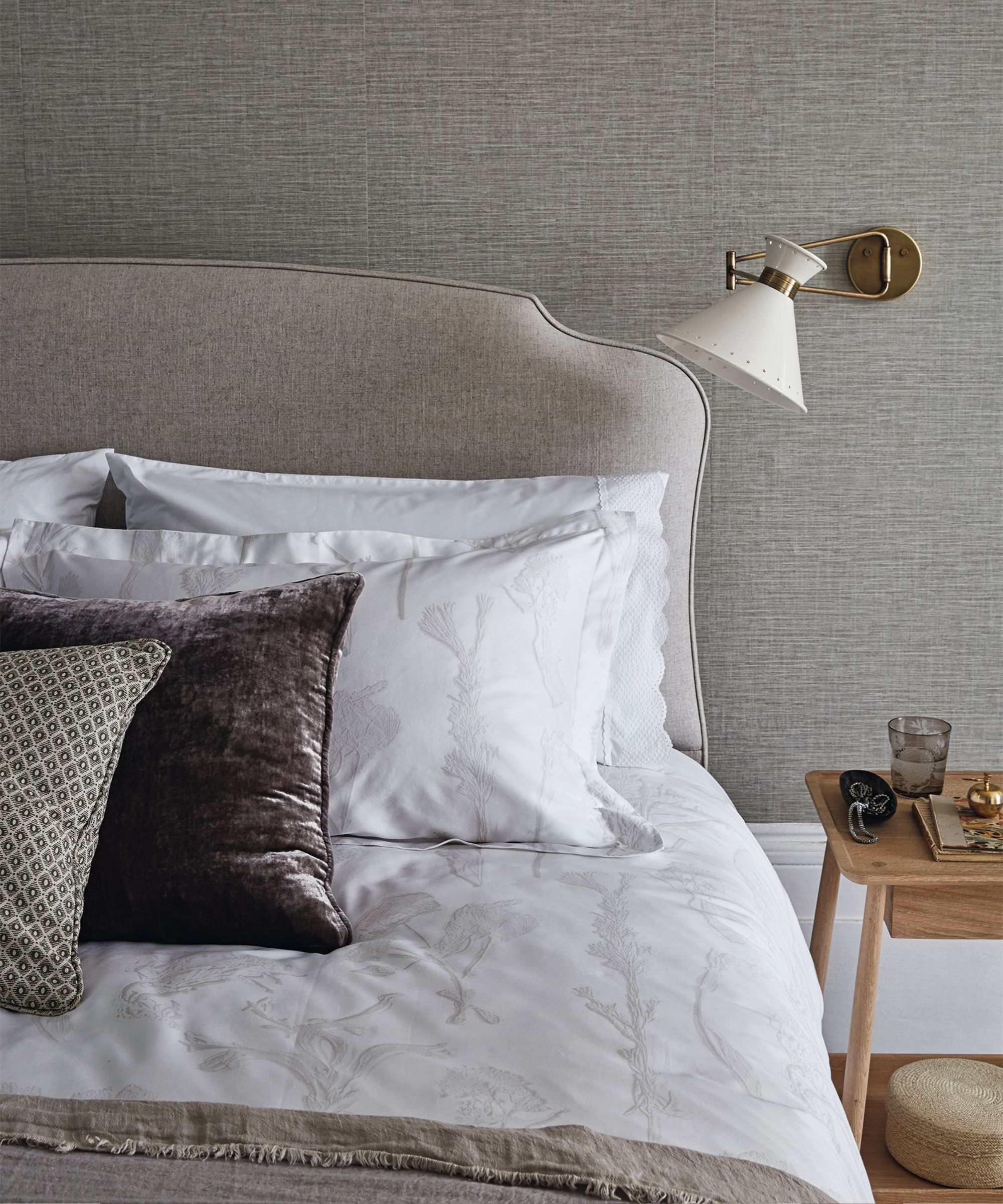
Light is a powerful conductor of the yang force of energy and fortune.
Lighting has a surprising effect on the energy of your home and, for good bedroom Feng Shui, is a conductor of the yang force of energy and fortune. For that reason, good bedroom lighting ideas can make a sleep space a powerful sanctuary.
Layering lighting through task lighting, ambient lighting, and accent lighting creates a functional but cozy space that can help reinvigorate your body and prepare you to take on new opportunities, which could bring luck into your life.
Position lights slightly away from the bedside so that their energizing effects do not lead to a restless night's sleep. What’s more, position your bed with no ceiling light above it, as this is believed to exert heavy downward pressure on a sleeper and cause adverse health issues in Feng Shui.
‘This can be very disconcerting and fracture quality sleep,’ adds Suzanne.
8. Use Room Dividers
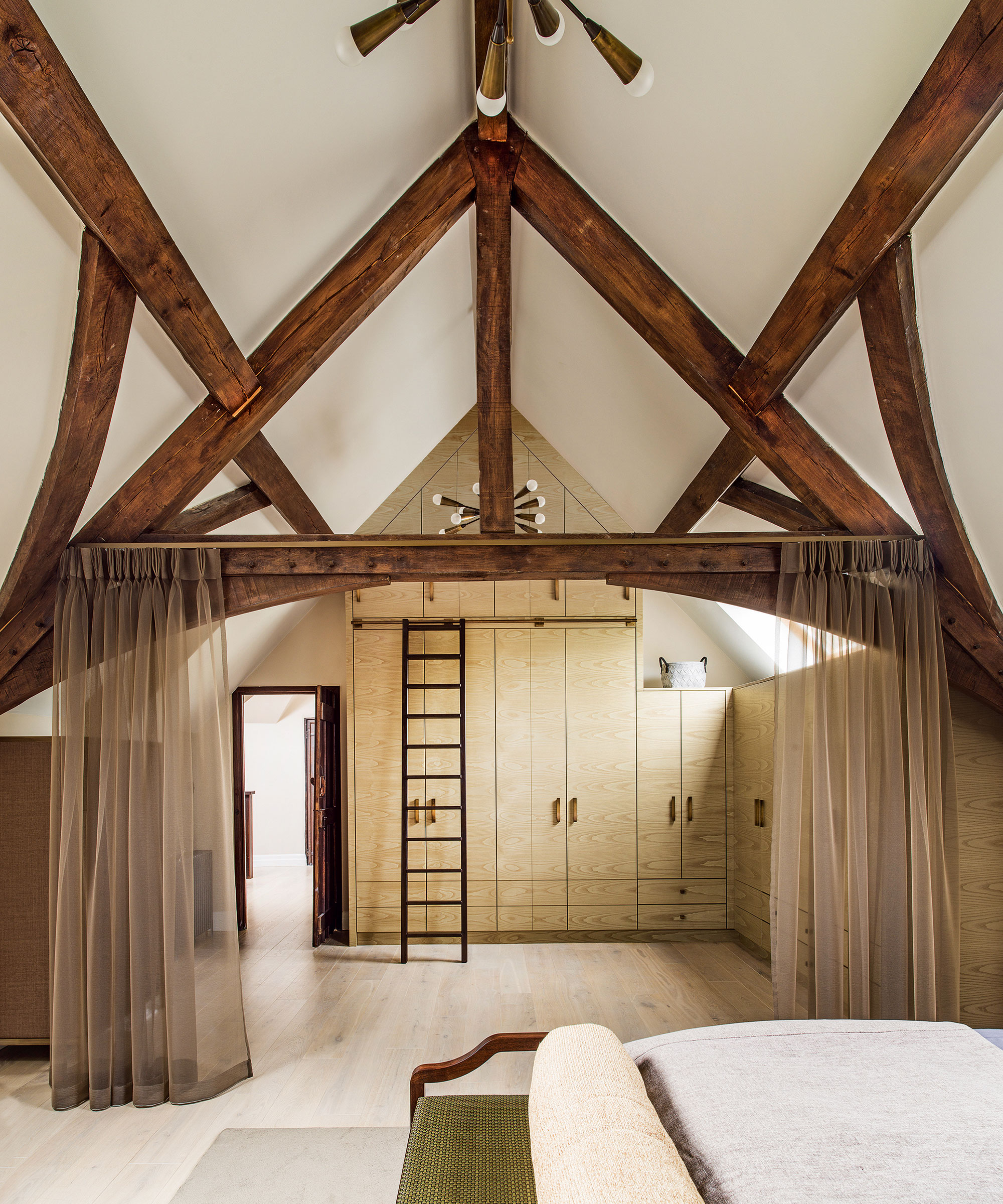
Room dividers are a brilliant way to 'zone' your space.
While the principles of Feng Shui suggest that you shouldn't use your bedroom for work, dressing, or anything that may stimulate your mind, this isn't always practical, especially if you live in a small home or share your home with multiple people.
If your main bedroom doubles up as a multifunctional space, then utilize creative room divider ideas to separate the space. Room dividers, such as the GLAMBERGET Room Divider available at IKEA, allow you to create a wide range of clever and inspiring ways to make your bedroom work for you. Think screens, partitions, and even the intelligent use of large furniture.
Beverly Biehl, founder of The Intuitive Interior, explains, 'No one wants to wake up to a desk with piles of unfinished work glaring at you. Something as simple as a folding screen will camouflage the desk until your morning routine shifts into work mode.'
Alternatively, a large bedroom can be 'zoned' off with drapes, sheer curtains, or even a sheet, as Beverly suggests, hung to divide the space. They needn't be pulled right across a room to utterly divide it, but they can create a beautiful pause, adding color, texture, or dimension.
'Adding a rug under the bed is a great way to block off the sleep area, so it won't be confused with the work area,' adds Beverly. 'And adding a small plant on the desk will further differentiate the "work" space from the "sleep" space.
'Avoid dividers with shelves on them, as the sharp edges ("sha chi," or knife edge) will eventually create physical pressure and even pain.'
9. Be Mindful of Mirror Placement
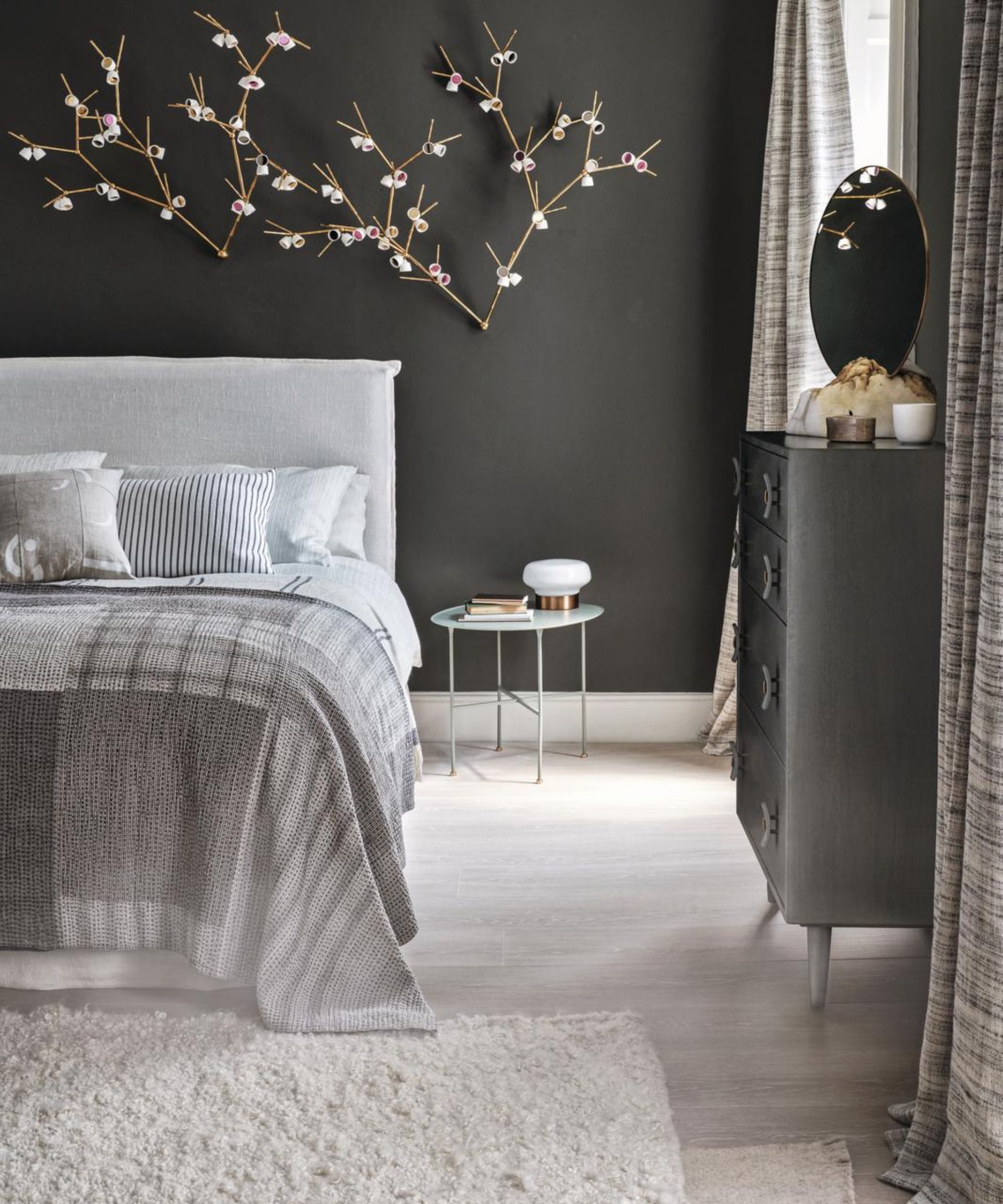
Your mirror can be angled like this, facing away from the bed and towards the door.
Beautiful bedroom mirror ideas can bring so much character and flow to a space. Aside from their obvious usefulness, mirrors are known to brighten a room and provide a fresh view of the space.
However, when it comes to Feng Shui advice for bedrooms, according to some experts, mirrors should ideally not be present in your sleep space. Mirrors are said to reflect light, making the energies of our bedroom too active, or 'yang,' causing insomnia, delays in sleep, restlessness, and negatively affecting relationships.
If you simply must have a mirror in the bedroom, make sure that it is not facing the bed, and cover it over at night. This is because placing a mirror directly opposite your bed is said to induce nightmares.
Suzanne explains, 'The key Feng Shui aspects to consider are that a mirror never reflects the sleeper in bed. There are many reasons for this, the simplest being that it can frighten a sleepyhead who sees a reflection on waking in the night, causing a disturbance to rest and making the heart beat faster.’
However, as mentioned earlier, you can use an angled mirror to ensure you can see the reflection of your door, provided it's not opposite an uncovered window, which will mean positive energy can bounce out of the room and into the rest of your home, where it will do its magic, rather than disturb your slumber.
The most important thing, design-wise, is to have your bed in the correct position with your door in view, rather than banish mirrors entirely from your sleep space.
If you're struggling to place yours, Suzanne advises, 'It can be a bit of a conundrum, so use the bed as your starting point. If you can’t see yourself in the mirror when you are lying or sitting in bed and it’s not directly reflecting the window, that’s going to be preferable.’
What to Shop
All prices were correct at the time of publication.
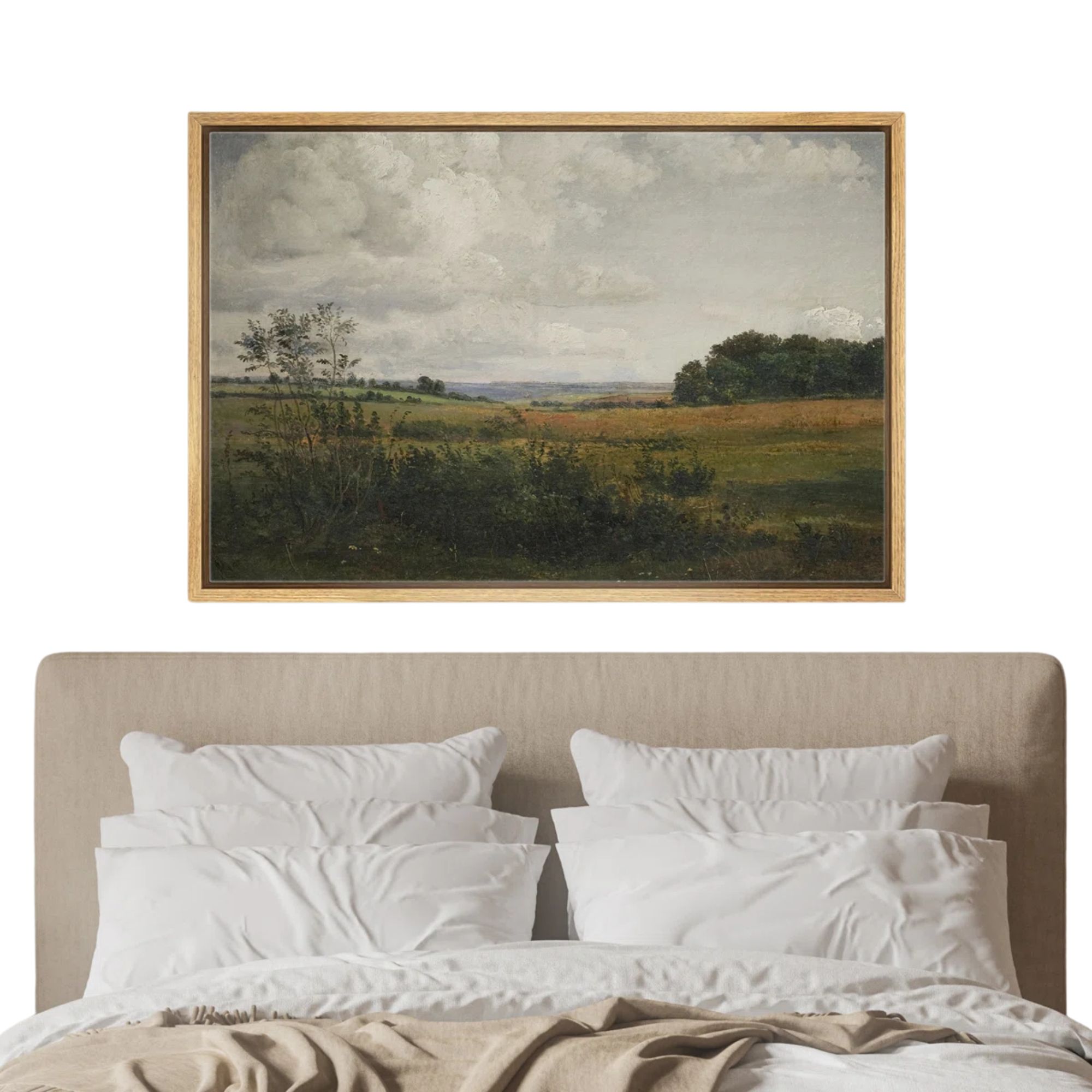
This landscape artwork will bring a sense of biophilic calm to your space, and comes framed and ready to hang straight out of the box.
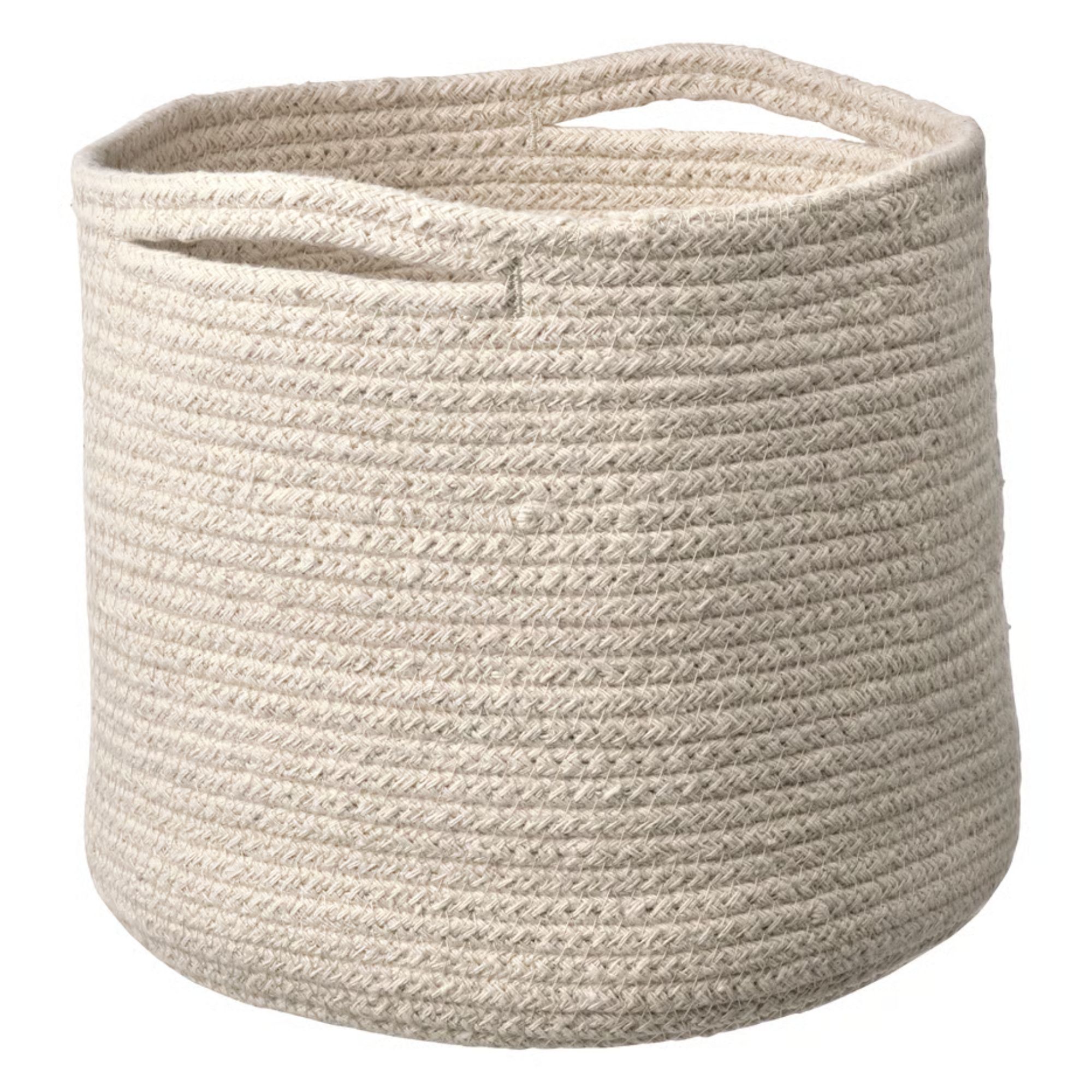
Storage in your bedroom should be stylish, as well as functional. This basket brings the outdoors in, with a natural finish, and is available in two sizes.

This rug is filled with positive Feng Shui colors, and is now reduced by an amazing $79. It's available in six other colors, too, and six sizes.
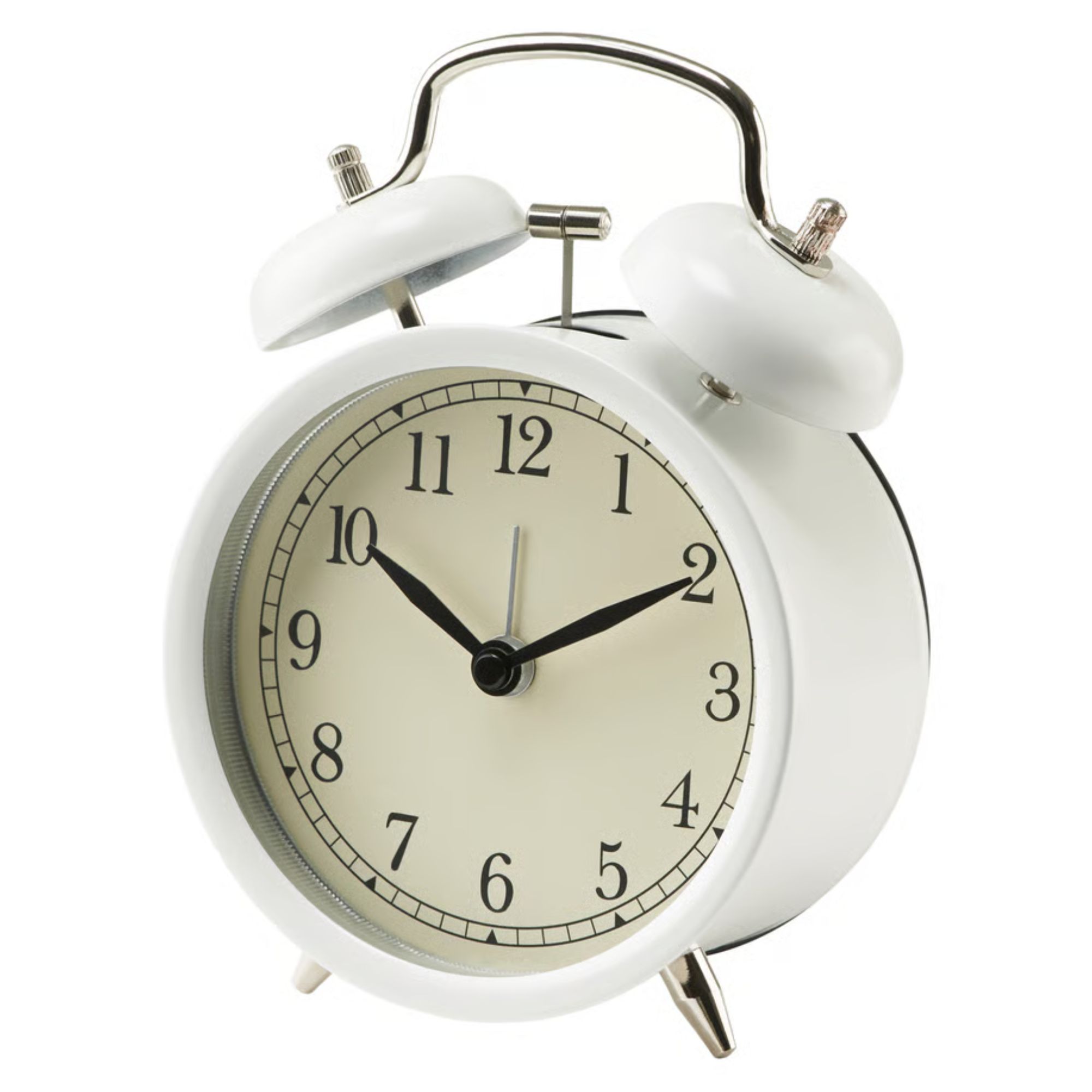
This is a modern alarm clock disguised as a vintage one, so it's silent yet effective when you need to wake up. Just note that batteries aren't included.
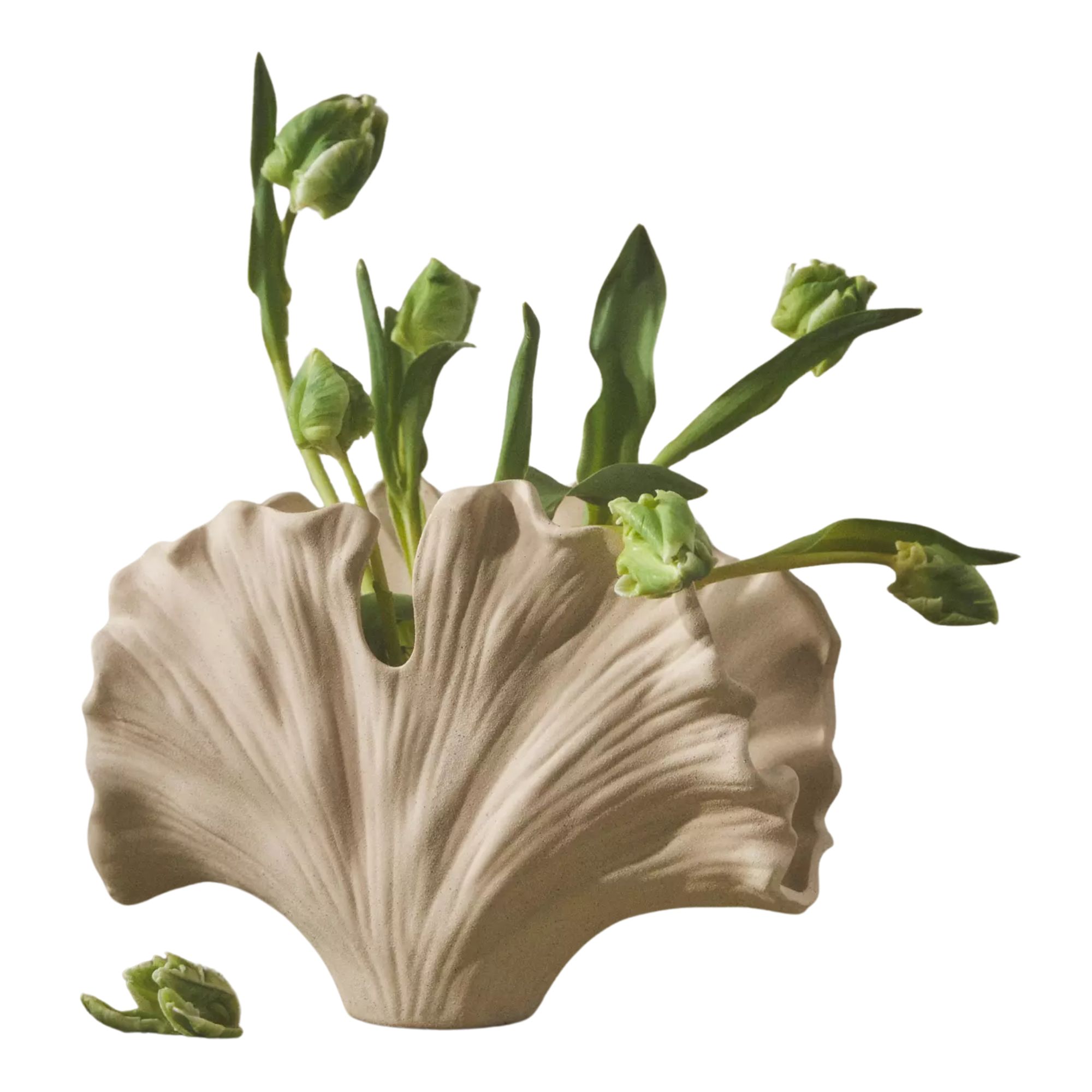
This ginkgo leaf vase will look gorgeous on any indoor plant shelf and draws upon the beauty of biophilic design, without the maintenance of a plant.
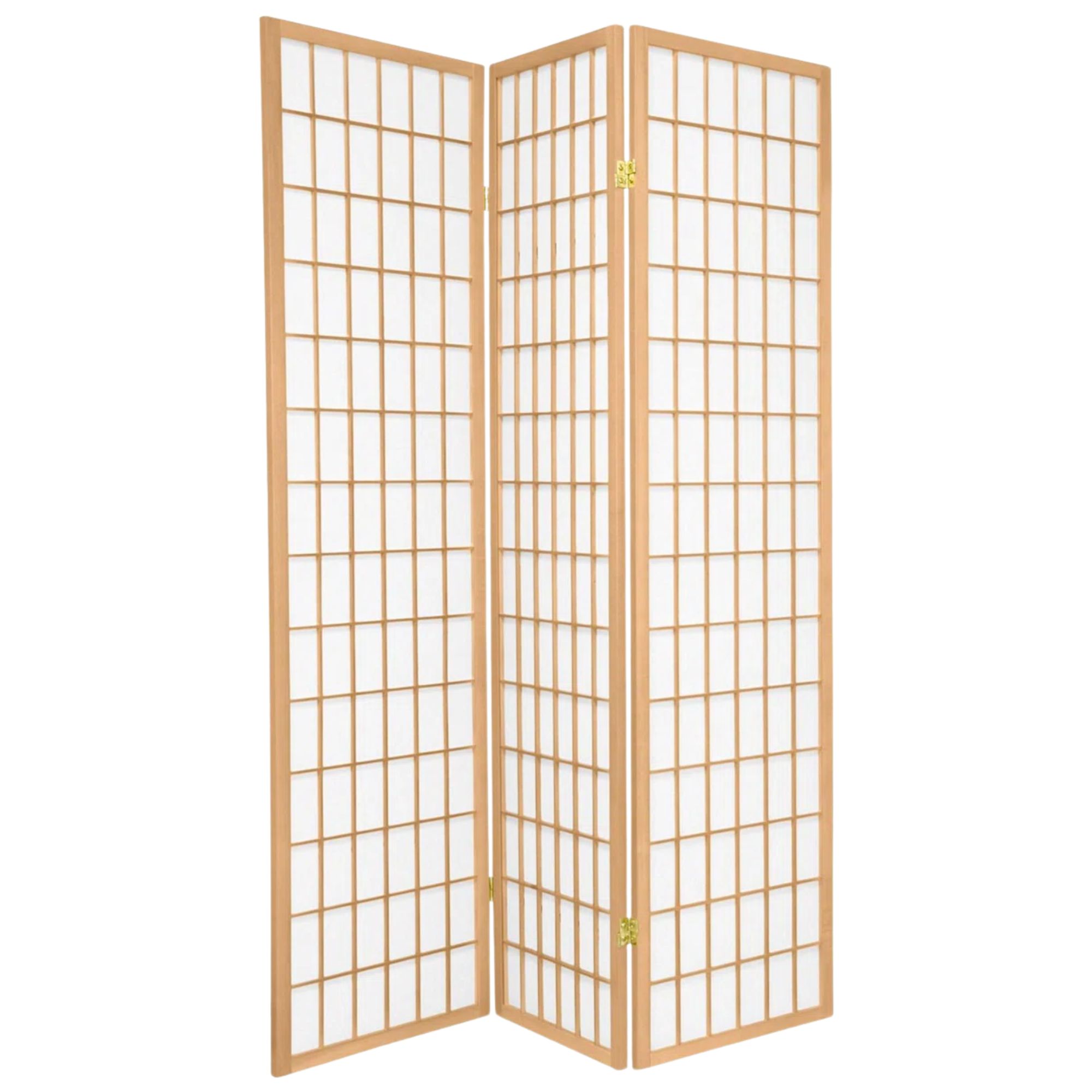
This room divider arrives fully assembled and is easy to clean with just a duster. It also conveniently folds for easy storage when not in use.
Meet the Expert
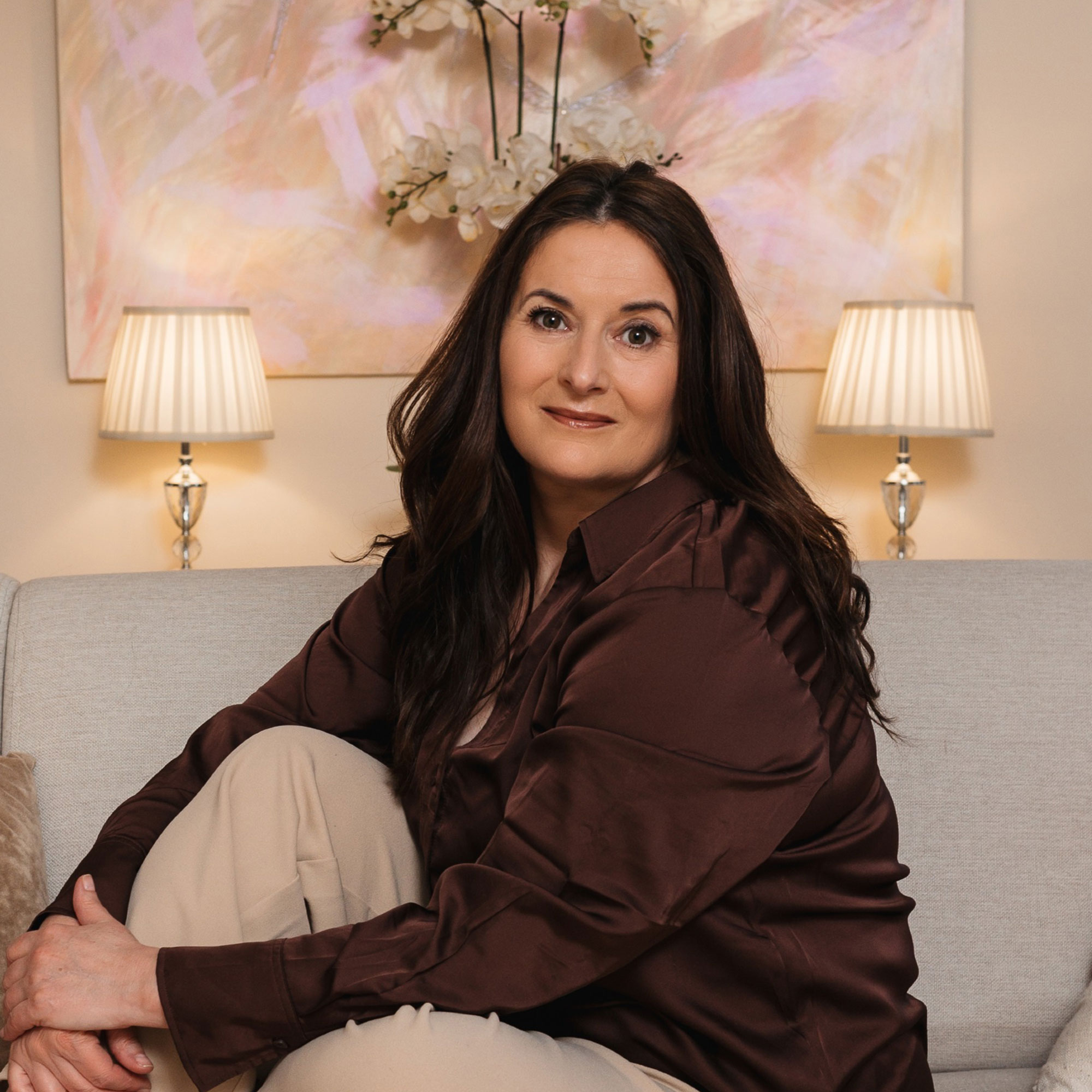
Suzanne is an interiors therapist, Feng Shui consultant, and public speaker, and is trained as a Flying Stars Feng Shui practitioner. She works nationally and internationally, offering bespoke consultations in homes and online around the world, and is also the best-selling author of Welcome Home, How Stuff Makes or Breaks Your Relationship.
Do you know about Feng Shui energy mapping? It can be transformative when done right.

Ottilie joined Homes & Gardens in 2024 as the News Writer on Solved, after finishing a Master's in Magazine Journalism at City, University of London. Now, as the Sleep Editor, she spends her days hunting deals and producing content on all things sleep – from mattresses and sheets to protectors and pillows, all of which she tests in her own home. She also has particular expertise in home fragrance, covering everything from candles to reed diffusers.
Previously, she has written for Livingetc and Motorsport Magazine, and also has a Master's degree in English Literature and History of Art from the University of Edinburgh, where she developed a love for inspiring interiors and architecture.
- Jennifer EbertEditor